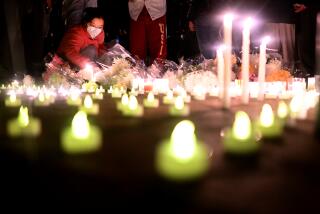Hostages’ Families Wait and Worry
- Share via
BEIJING — The conflict in Iraq seemed a world away until the picture of eight Chinese laborers kidnapped by insurgents this week hit the front pages of major newspapers here.
The Chinese government has promised to do what it can to negotiate their freedom after the release of a videotape Tuesday showing the workers being held by armed militants.
That is little consolation to the relatives of the men, who were driven by poverty and desperation to seek work in one of the most dangerous corners of the world.
“I told him not to go, but he went behind my back,” Gao Yun, whose husband, Lin Qiang, appeared in the video, told state media.
Lin, 39, had been making ends meet at home by running a small stall selling pesticides. But business was bad, his wife had a heart condition and they needed extra money. Early last year, he and his brother Lin Xiong, 35, headed for Iraq. Now both are missing.
The Lin brothers and the other six workers are natives of Pingtan, an island in the southern Chinese province of Fujian. The area is known for exporting laborers, usually through human traffickers known as snakeheads.
The passage can be costly: about $6,000 to reach Singapore and $10,000 for the journey to Japan.
A trip to Iraq costs less than $4,000, making the war-torn country a popular destination for residents of Pingtan, who make less than $120 a year.
Most have to borrow money from loan sharks, who charge as much as 25% in annual interest.
This migration of workers has put Chinese citizens in various global hot spots.
Last April, seven workers from Pingtan were kidnapped in Iraq and later freed. Two months later, 11 Chinese were killed by gunfire at a construction site in Afghanistan. In October, one of two Chinese engineers held hostage in Pakistan died when Pakistani army commandos tried to free them.
Among the eight workers who went missing this week is Chen Qinai, 36, the youngest of five siblings and a father of three. Relatives told state media that his meager income as a butcher was not enough to support his bedridden parents and his young children. Chen earned about $300 a month doing odd jobs in Iraq, his brother-in-law said. But work was hard to come by, and he hadn’t sent money home in many months.
In the video released Tuesday, the hostage takers claimed that the eight Chinese nationals -- who were shown holding up their passports -- had been working for an American contractor. Beijing said that was not the case. The men had failed to find work in Iraq and were traveling by land to Jordan when they were captured, according to the government.
A Chinese businessman who knew the eight told Chinese media that the workers had been cheated by the middlemen who promised lucrative jobs that never materialized. They found temporary employment rebuilding a Chinese-owned clothing plant, he said, but that didn’t last and they wanted to try their luck in Jordan.
The Iraqi insurgents threatened to kill the men within 48 hours unless China clarified its role in the Iraq conflict. There was no word on their fate late Thursday.
China opposed the U.S.-led war and did not send troops to support it, but it generally has not been critical of the American role in Iraq.
“China wants to maintain good relations with the U.S.,” said Joseph Cheung, a political scientist at the City University of Hong Kong. “It also wants to present itself as a friend to the Arab world.”
Beijing is eager to resolve the hostage crisis, especially with the spring festival, the nation’s major holiday season, coming in several weeks.
“I just hope our government can get them out safely,” said the mother of 18-year-old Zhou Sunqin.
Zhou, the youngest of the eight captives, went to Iraq with his cousin. His mother hasn’t heard from them in a while and learned of the abduction through television coverage.
“I’m so worried,” she said.
More to Read
Sign up for Essential California
The most important California stories and recommendations in your inbox every morning.
You may occasionally receive promotional content from the Los Angeles Times.













